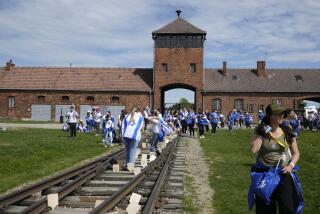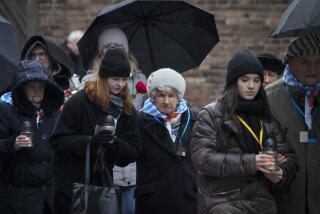Rites Seen as German-Polish Milestone
WARSAW — A week of events commemorating the 50th anniversary of the Warsaw Uprising came to an end Tuesday with Poles and Germans predicting that the remembrance will prove a turning point in their postwar relations.
Observers on both sides of the Oder-Neisse Line said German President Roman Herzog, who on Monday asked Poles to forgive his country for atrocities in World War II, may finally have closed a bitter and painful period in relations between the former enemies.
“This declaration was in a sense the end of a long chapter of Polish-German hatred,” said Bronislaw Geremek, head of the Polish Parliament’s foreign relations committee. “President Herzog said exactly what the Polish public needed to hear.”
Guenter Verheugen, manager of the opposition Social Democratic Party in Bonn, described Herzog’s speech as “courageous and forward-looking” and called on all Germans to honor it. He said the apology finished what former German Chancellor Willy Brandt started 24 years ago, when he knelt at the site of Warsaw’s Jewish ghetto, which the Germans had destroyed in the war.
“With his speech in Warsaw, the president made an essential contribution to the further development of the German-Polish friendship,” Verheugen said.
Herzog’s speech was splashed across front pages throughout Poland and Germany and worked to instantly defuse opposition to his presence at the anniversary ceremonies. Many Polish veteran groups had objected to President Lech Walesa’s decision to invite Herzog, saying it was inappropriate for him to attend.
The uprising by Warsaw residents against German occupiers began Aug. 1, 1944, but from the start the ill-equipped Home Army had no chance against the heavily armed enemy. The underdog Poles surrendered 63 days later after 200,000 had been killed, most of them civilians. It was the bloodiest defeat of the war in Poland, but it has since become a proud national symbol of Polish resistance to tyranny.
“Of all the speeches, Herzog’s was the most meaningful and decent. I was touched by it,” said Zbigniew Brym, a veteran leader who had opposed Herzog’s visit. “We as a Catholic nation are always ready to forgive, but as in the Bible, we need the prodigal son to come and say: ‘Father, I have sinned. Forgive me.’ Until now, we did not have that.”
Jan Parys, a former Polish defense minister who organized opposition to Herzog’s visit, said the speech was the most significant event in postwar German-Polish relations. He said Herzog’s pledge that Germany will pave the way for Polish entry into European institutions may, in the end, prove even more important than the apology.
But newfound enthusiasm across Poland for Germany came in stark contrast to comments made Tuesday about Russia. Poles blame Russia for much of their wartime suffering, but the Russian representative to the Warsaw remembrance made no effort to echo Herzog’s contrition.
A spokesman for Walesa said the president had expected the Russians to make a similar gesture of goodwill, but instead the Russians had wasted the opportunity. Polish Foreign Minister Andrzej Olechowski sharply criticized Sergei A. Filatov, the top aide to Russian President Boris N. Yeltsin who represented Russia at the remembrance.
“We will remember President Herzog’s speech, just as we will not be remembering Sergei Filatov’s speech,” Olechowski said.
Times staff writer Mary Williams Walsh, in Berlin, contributed to this report.
More to Read
Sign up for Essential California
The most important California stories and recommendations in your inbox every morning.
You may occasionally receive promotional content from the Los Angeles Times.









